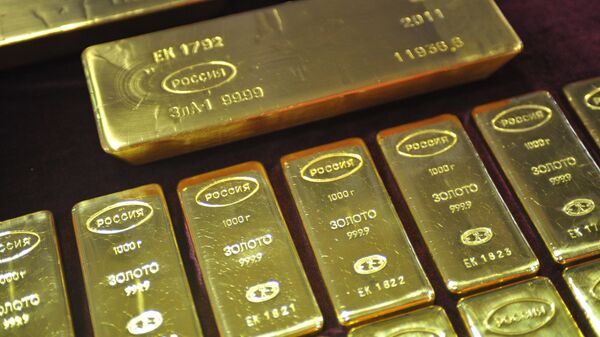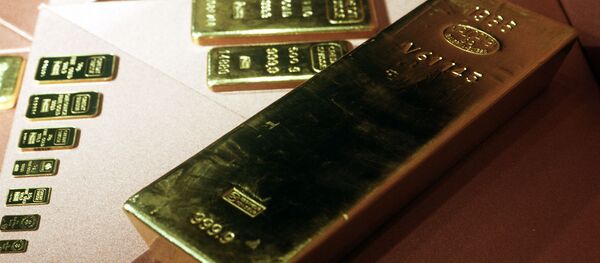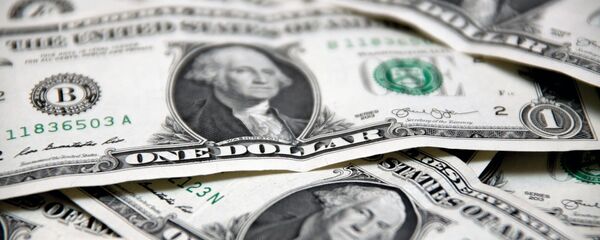Daily Express has cited Adrian Ash, the director of research at BullionVault, as warning that Russia’s gold-buying spree is a “bad sign” for world peace and cooperation.
READ MORE: Russia Largest Buyer of GOLD in the World in Q1 2019, China Second
Referring to the World Gold Council (WGC), the publication noted that Russia has boosted its reserved by 145.5 tons in the first quarter of this year, which marks a 68 percent uptick from the same period of 2018.
Incidentally, the gold stockpiling comes on the heels of a persistent de-dollarisation trend in Russia, as the government has beefed up its efforts to drift away from American assets, opting for transactions in national currencies instead.
"Russia was again the largest buyer, adding 55.3t in Q1. This brought gold reserves to 2,168.3t (19% of total reserves). Russia bought 274.3t in 2018 — the fourth consecutive year of +200t increases – while drastically reducing its US Treasury holdings, as part of its ‘de-dollarisation’ drive", the WGC said in a report issued earlier this month.
Despite its fast-growing reserves, Russia’s gold holdings still represent less than 20 percent of its total foreign reserves, Ash stressed.
However, if the stockpiling trend persists at the same pace, the country will be able to overtake France and Italy and enter the top three gold-holders within a year.
“The golden rule is that whoever owns the gold has the power. While gold hasn’t had any official role in the monetary system for nearly 50 years, it’s no coincidence that the United States remains by far the largest national holder. To match the size of US holdings, Moscow would need to keep buying Russia’s entire mine output for the next 20 years”, Ash said, adding that Russia sees the precious metal as a way to “limit US power by reducing its exposure” to the greenback.
Andrei Suzdaltsev, an independent expert on post-Soviet states, has explained that the situation in the financial market is changing, and that Russia is not the only country actively buying bullions, it’s a general trend that has been triggered by grievances against the main reserve currency – the dollar.
READ MORE: Russia Continues to Dump Dollar, Buying Up 31 Tonnes of Gold in Single Month
According to him, it’s been confirmed that the “the gradual ousting” of the greenback from international financial circulation is the main trend these days, and that it was quite predictable.
“This is where the discontent in the comments in the West’s financial and economic publications stems from: everyone understands that the US currency’s sphere of influence is shrinking”.
Commenting on Ash's "bad sign" remark, David Gibson, Managing Director of GoldVu, an international physical precious metals company, said that the bullion shopping has little to do with "uncertainty of war or a break-down in international cooperation".
He noted that Russia's holdings started increasing in 2007 — long before this "ongoing anti-Russian hysteria started and the vote by the 2014 Crimean public to join the Russian Federation, and the subsequent economic sanctions against Russia".
"To achieve [a reasonable degree of self-sufficiency in both production of goods and its financial economy], Russia needed to be as independent of the US Dollar as possible, and holding surpluses in gold rather than US Treasuries is the best place to start. Holding your surpluses in gold also created a certain level of immunity from any acts by the US government or the world's US dollar dependent economy", Gibson says.
According to him, attempting to link Moscow's gold reserves to recent events in the world is a "stretch", as Russia has been steadily boosting its holdings each month for the last 12 years.
"The storage of surplus funds into gold by any government is not to do with any increased likelihood of war, but just a simple matter of good financial housekeeping", he stresses.
Russian Central Bank head Elvira Nabiullina, has on multiple occasions stressed that the country has been diversifying its foreign exchange reserves more than other states due to the economic and political risks that it faces.





